Neuroscience
UPDATE (10/23/2013): The authors have commented to offer their explanation for the omitted attribution.
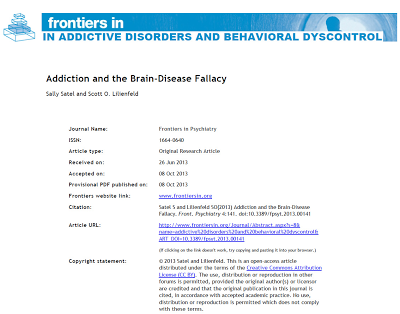
An entire book chapter from a popular science trade book has been published as an "Original Research Article" in Frontiers in Psychiatry. The article appears as part of a Research Topic on Alternative Models of Addiction in Frontiers in Addictive Disorders and Behavioral Dyscontrol, a specialty section within Frontiers in Psychiatry.
I downloaded the provisional PDF and was initially tipped off by the curious citation style and copious use of footnotes, unlike the standard reference list seen in journal articles (e.g., APA format). I looked for a mention of the published book but could not find it anywhere. Perhaps this will be corrected in later editions of the article (if any).
The book is copyrighted (see below), but the nearly identical article is covered by a Creative Commons agreement, which states that the open-access text can be freely cited with attribution.
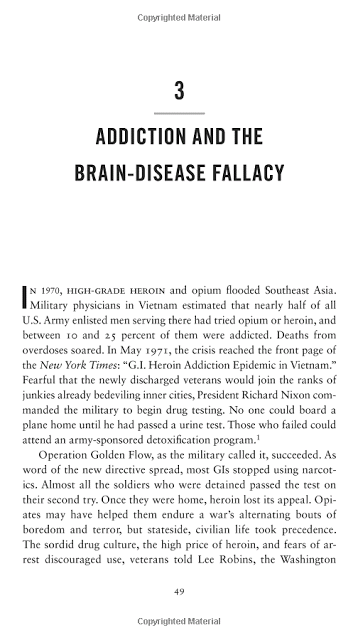
Here's the Introduction, which is identical to Chapter 3 of the book (see above image).
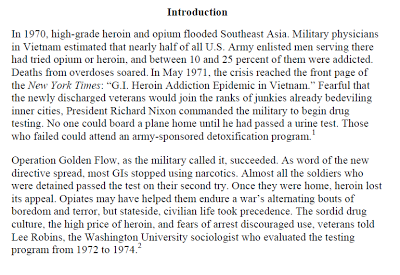
But here's an abstract that might be unique to the Frontiers article (Satel & Lillienfeld, 2013):
Below is page 6 of the Provisional PDF.
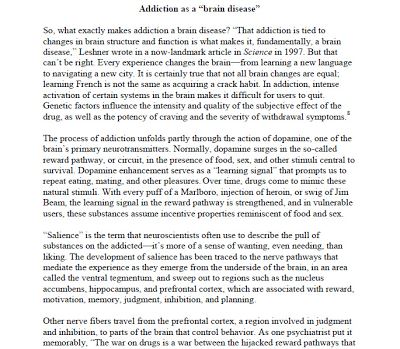
Compare to pages 51 and 52 of the book.
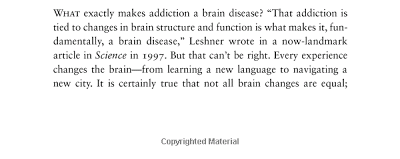
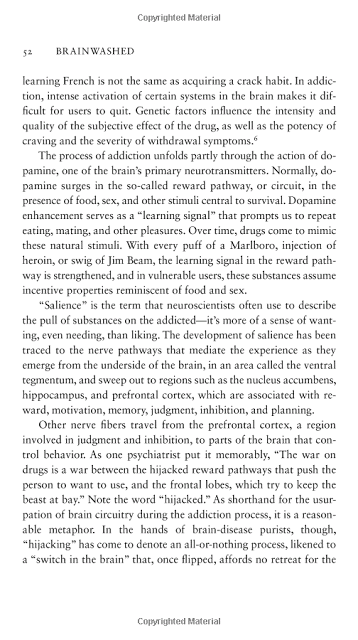
This is such an egregious violation that I suspect it must be some sort of a mistake. I've had my differences of opinion with the book's authors,1 but I don't want to be seen as harboring animus to discredit them.2 Which is why I'm not repeatedly calling them out by name in the post (though it's obvious who they are). I do feel somewhat bad about the whole situation, and will post an addendum to clear up any misunderstandings, or any subterfuge by an unknown third party. I've contacted the journal editor, and will keep you posted.
Footnotes
1 I do agree with some parts of the book's agenda (and in fact the authors include Mind Hacks, Neuroskeptic, and The Neurocritic in their Acknowledgments -- which is good, since many of their examples are from our blogs). But I disagree in particular with their idea that shaming addicts is helpful (and also with their stance on property dualism). See these posts:
The Destructive Power of Shame
A Conversation on "MINDLESS NEUROSCIENCE"
All Washed Up
Finding Middle Ground on Neuroscience, by Daniel Lende
Book Review: Brainwashed, by Neuroskeptic
2 Full disclosure: I also know that the first author is affiliated with the American Enterprise Institute, a conservative think tank ideologically opposed to my political beliefs.
References
Satel S, Lilienfeld SO (2013). Brainwashed: The Seductive Appeal of Mindless Neuroscience. Basic Books.
Satel S, Lilienfeld SO (2013). Addiction and the Brain-Disease Fallacy. Frontiers in Addictive Disorders and Behavioral Dyscontrol. doi: 10.3389/fpsyt.2013.00141
- Promoting Academic Writing
Interesting piece in today's New York Times about writers taking promotional book "tours" via blogs: The Author Will Take Q.’s Now By KARA JESELLA Published: September 2, 2007 [snip] Bloggers have written about books since, well, the beginning of...
- Abstract Of The Day: Of Time And The River
Takahashi T. Time-estimation error following Weber-Fechner law may explain subadditive time-discounting.. Medical Hypotheses. 2006 Jul 25; [Epub ahead of print] Department of Cognitive and Behavioral Science, The University of Tokyo, 3-8-1 Komaba, Meguro,...
- If You Search, Read This Book
I'm preparing for another semester of teaching Digital Information Services & Providers, or as I like to call it, "Advanced Reference." At the start of the semester, we review some favorite resources from reference like Academic Search Premier...
- 2 Clicks 2 Stuff
I'm listening to Roy Tennant's keynote at the Access 2006 Library Conference. He's terrific, as usual, and what I'm really struck with is his suggestion (challenge?) that we get our users to "stuff" within 2 clicks. A good example he...
- Is Embodied Cognition A "no Brainer"?
Brains, HUH, yeah, what are they good for?When we say "there are no mental representations", people often hear 'the brain doesn't do anything'. Because this is obviously not true, people sometimes just assume we simply cannot be talking sense...
Neuroscience
Should a book chapter be republished as a peer-reviewed article with no attribution?
UPDATE (10/23/2013): The authors have commented to offer their explanation for the omitted attribution.

An entire book chapter from a popular science trade book has been published as an "Original Research Article" in Frontiers in Psychiatry. The article appears as part of a Research Topic on Alternative Models of Addiction in Frontiers in Addictive Disorders and Behavioral Dyscontrol, a specialty section within Frontiers in Psychiatry.
I downloaded the provisional PDF and was initially tipped off by the curious citation style and copious use of footnotes, unlike the standard reference list seen in journal articles (e.g., APA format). I looked for a mention of the published book but could not find it anywhere. Perhaps this will be corrected in later editions of the article (if any).
The book is copyrighted (see below), but the nearly identical article is covered by a Creative Commons agreement, which states that the open-access text can be freely cited with attribution.
- click on images to enlarge -

Chapter 3
Here's the Introduction, which is identical to Chapter 3 of the book (see above image).

Frontiers in Addictive Disorders and Behavioral Dyscontrol
But here's an abstract that might be unique to the Frontiers article (Satel & Lil
The notion that addiction is a ''brain disease'' has become widespread and rarely challenged.The brain disease model implies erroneously that the brain is necessarily the most important and useful level of analysis for understanding and treating addiction. This paper will explain the limits of over-medicalizing -- while acknowledging a legitimate place for medication in the therapeutic repertoire -- and why a broader perspective on the problems of the addicted person is essential to understanding addiction and to providing optimal care. In short, the brain disease model obscures the dimension of choice in addiction, the capacity to respond to incentives, and also the essential fact people use drugs for reasons (as consistent with a self-medication hypothesis). The latter becomes obvious when patients become abstinent yet still struggle to assume rewarding lives in the realm of work and relationships. Thankfully, addicts can choose to recover and are not helpless victims of their own ''hijacked brains.''
Below is page 6 of the Provisional PDF.

Frontiers in Addictive Disorders and Behavioral Dyscontrol
Compare to pages 51 and 52 of the book.

Chapter 3, page 51

Chapter 3, page 52
This is such an egregious violation that I suspect it must be some sort of a mistake. I've had my differences of opinion with the book's authors,1 but I don't want to be seen as harboring animus to discredit them.2 Which is why I'm not repeatedly calling them out by name in the post (though it's obvious who they are). I do feel somewhat bad about the whole situation, and will post an addendum to clear up any misunderstandings, or any subterfuge by an unknown third party. I've contacted the journal editor, and will keep you posted.
Footnotes
1 I do agree with some parts of the book's agenda (and in fact the authors include Mind Hacks, Neuroskeptic, and The Neurocritic in their Acknowledgments -- which is good, since many of their examples are from our blogs). But I disagree in particular with their idea that shaming addicts is helpful (and also with their stance on property dualism). See these posts:
The Destructive Power of Shame
A Conversation on "MINDLESS NEUROSCIENCE"
All Washed Up
Finding Middle Ground on Neuroscience, by Daniel Lende
Book Review: Brainwashed, by Neuroskeptic
2 Full disclosure: I also know that the first author is affiliated with the American Enterprise Institute, a conservative think tank ideologically opposed to my political beliefs.
References
Satel S, Lilienfeld SO (2013). Brainwashed: The Seductive Appeal of Mindless Neuroscience. Basic Books.
Satel S, Lilienfeld SO (2013). Addiction and the Brain-Disease Fallacy. Frontiers in Addictive Disorders and Behavioral Dyscontrol. doi: 10.3389/fpsyt.2013.00141
- Promoting Academic Writing
Interesting piece in today's New York Times about writers taking promotional book "tours" via blogs: The Author Will Take Q.’s Now By KARA JESELLA Published: September 2, 2007 [snip] Bloggers have written about books since, well, the beginning of...
- Abstract Of The Day: Of Time And The River
Takahashi T. Time-estimation error following Weber-Fechner law may explain subadditive time-discounting.. Medical Hypotheses. 2006 Jul 25; [Epub ahead of print] Department of Cognitive and Behavioral Science, The University of Tokyo, 3-8-1 Komaba, Meguro,...
- If You Search, Read This Book
I'm preparing for another semester of teaching Digital Information Services & Providers, or as I like to call it, "Advanced Reference." At the start of the semester, we review some favorite resources from reference like Academic Search Premier...
- 2 Clicks 2 Stuff
I'm listening to Roy Tennant's keynote at the Access 2006 Library Conference. He's terrific, as usual, and what I'm really struck with is his suggestion (challenge?) that we get our users to "stuff" within 2 clicks. A good example he...
- Is Embodied Cognition A "no Brainer"?
Brains, HUH, yeah, what are they good for?When we say "there are no mental representations", people often hear 'the brain doesn't do anything'. Because this is obviously not true, people sometimes just assume we simply cannot be talking sense...
